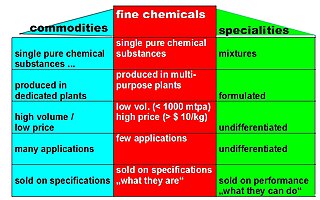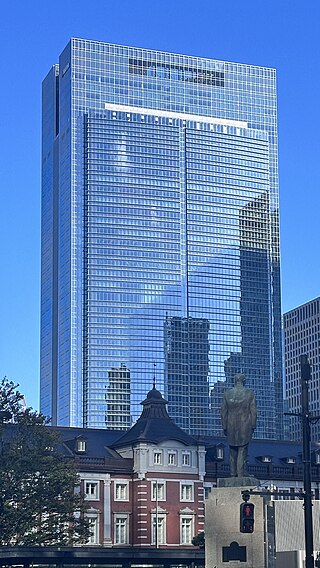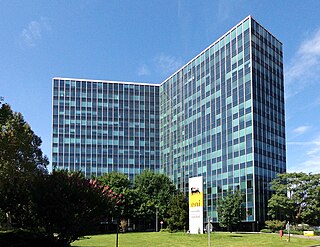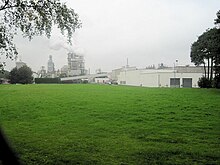
The chemical industry comprises the companies and other organizations that develop and produce industrial, specialty and other chemicals. Central to the modern world economy, it converts raw materials into commodity chemicals for industrial and consumer products. It includes industries for petrochemicals such as polymers for plastics and synthetic fibers; inorganic chemicals such as acids and alkalis; agricultural chemicals such as fertilizers, pesticides and herbicides; and other categories such as industrial gases, speciality chemicals and pharmaceuticals.

Import substitution industrialization (ISI) is a trade and economic policy that advocates replacing foreign imports with domestic production. It is based on the premise that a country should attempt to reduce its foreign dependency through the local production of industrialized products. The term primarily refers to 20th-century development economics policies, but it has been advocated since the 18th century by economists such as Friedrich List and Alexander Hamilton.

A country's industrial policy (IP) or industrial strategy is its official strategic effort to encourage the development and growth of all or part of the economy, often focused on all or part of the manufacturing sector. The government takes measures "aimed at improving the competitiveness and capabilities of domestic firms and promoting structural transformation". A country's infrastructure is a major enabler of the wider economy and so often has a key role in IP.

Hoechst AG was a German chemicals, later life sciences, company that became Aventis Deutschland after its merger with France's Rhône-Poulenc S.A. in 1999. With the new company's 2004 merger with Sanofi-Synthélabo, it became a subsidiary of the resulting Sanofi-Aventis pharmaceuticals group.

The petroleum industry, also known as the oil industry or the oil patch, includes the global processes of exploration, extraction, refining, transportation, and marketing of petroleum products. The largest volume products of the industry are fuel oil and gasoline (petrol). Petroleum is also the raw material for many chemical products, including pharmaceuticals, solvents, fertilizers, pesticides, synthetic fragrances, and plastics. The industry is usually divided into three major components: upstream, midstream, and downstream. Upstream regards exploration and extraction of crude oil, midstream encompasses transportation and storage of crude, and downstream concerns refining crude oil into various end products.
Takashi Hikino is specially appointed professor at the Graduate School of Management at Kyoto University after serving as associate professor of industrial and business organization at the Graduate School of Management at Kyoto University where he taught industrial organization, business economics, and corporate strategy, and comparative management since 1998. He attended Hitotsubashi University, where he studied at the Graduate School of Sociology(B.A. and M.A. )

Showa Denko K. K., founded in 1939 by the merger of Nihon Electrical Industries and Showa Fertilizers, both established by a Japanese entrepreneur Nobuteru Mori, is a Japanese chemical company producing chemical products and industrial materials.

In chemistry, fine chemicals are complex, single, pure chemical substances, produced in limited quantities in multipurpose plants by multistep batch chemical or biotechnological processes. They are described by exacting specifications, used for further processing within the chemical industry and sold for more than $10/kg. The class of fine chemicals is subdivided either on the basis of the added value, or the type of business transaction, namely standard or exclusive products.
The industrialization of China refers to the process of China undergoing various stages of industrialization. The focus is on the period after the establishment of the People's Republic of China where China experienced its most notable growths in industrialization. Although Chinese industrialization is largely defined by its 20th-century campaigns, China has a long history that contextualizes the proto-industrial efforts, and explains the reasons for delay of industrialization in comparison to Western countries.
Proto-industrialization is the regional development, alongside commercial agriculture, of rural handicraft production for external markets. The term was introduced in the early 1970s by economic historians who argued that such developments in parts of Europe between the 16th and 19th centuries created the social and economic conditions that led to the Industrial Revolution. Later researchers suggested that similar conditions had arisen in other parts of the world.

Mitsui Chemicals is a Japanese chemicals company listed on the Nikkei with business interests in Japan, Europe, China, Southeast Asia and the USA. It is one of the leading chemical companies in Japan and is part of the Mitsui conglomerate. The company mainly deals in performance materials, petrochemicals and basic chemicals and functional polymeric materials.

Montecatini was an important Italian chemicals company founded in 1888. It was called: quasi-monopolist of the Italian chemical industry in the time between World War I and the end of World War II. Problems led to a merger with the Edison company in 1966 forming the Montedison company.
The United Kingdom, where the Industrial Revolution began in the late 18th century, has a long history of manufacturing, which contributed to Britain's early economic growth. During the second half of the 20th century, there was a steady decline in the importance of manufacturing and the economy of the United Kingdom shifted toward services. Manufacturing, however, remains important for overseas trade and accounted for 44% of goods exports in 2014. In June 2010, manufacturing in the United Kingdom accounted for 8.2% of the workforce and 12% of the country's national output. The East Midlands and West Midlands were the regions with the highest proportion of employees in manufacturing. London had the lowest at 2.8%.
Commodity chemicals are a group of chemicals that are made on a very large scale to satisfy global markets. The average prices of commodity chemicals are regularly published in the chemical trade magazines and web sites such as Chemical Week and ICIS. There have been several studies of the scale and complexity of this market for example in the USA.

Sumitomo Chemical Co., Ltd. is a major Japanese chemical company. The company is listed on the first section of the Tokyo Stock Exchange and is a constituent of the on the Nikkei 225 stock index. It's a member of the Sumitomo group and was founded in 1913 as a fertilizer manufacturing plant.
The share of the industry of Colombia in the country's gross domestic product (GDP) has shifted significantly in the last few decades. Data from the World Bank show that between 1965 and 1989 the share of industry—including construction, manufacturing, and mining—increased from 27 percent to 38 percent of GDP. However, since then the share has fallen considerably, down to approximately 29 percent of GDP in 2007. This pattern is about the average for middle-income countries.

Versalis is a wholly owned subsidiary of Italian oil supermajor Eni specializing in the production of chemicals. With more than 5,000 employees and a production of about 9.5 million tons of chemical products in 2018, it is by far the largest chemical company in Italy and one of the largest in Europe.
Specialty chemicals are particular chemical products which provide a wide variety of effects on which many other industry sectors rely. Some of the categories of speciality chemicals are adhesives, agrichemicals, cleaning materials, colors, cosmetic additives, construction chemicals, elastomers, flavors, food additives, fragrances, industrial gases, lubricants, paints, polymers, surfactants, and textile auxiliaries. Other industrial sectors such as automotive, aerospace, food, cosmetics, agriculture, manufacturing, and textiles are highly dependent on such products.

Alfred Henri Aftalion, better known as Fred Aftalion, was a French chemical engineer who held leadership positions in the French chemical industry for three decades. He also served as Vice-President of ALEPS, the Association pour la Liberté Economique et le Progrès Social . He wrote and commented on economics and politics from a viewpoint of economic liberalism via ALEPS and Radio Courtoisie.
The chemical industry of India is a major industry in the Indian economy and as of 2022, contributes 7% of the country's Gross Domestic Product (GDP). India is the world's sixth largest producer of chemicals and the third largest in Asia, as of 2022. The value of the Indian chemical industry was estimated at $100 billion dollars in 2019. The chemical industry of India generates employment for five million people. The Indian chemical industry produces 80,000 different chemical products. India was also the third largest producer of plastic in 2019. As of September 2019, the alkali chemical industry produced 71% of all chemicals produced in India. India's chemical industry accounts about 14% of production in Indian industries.














